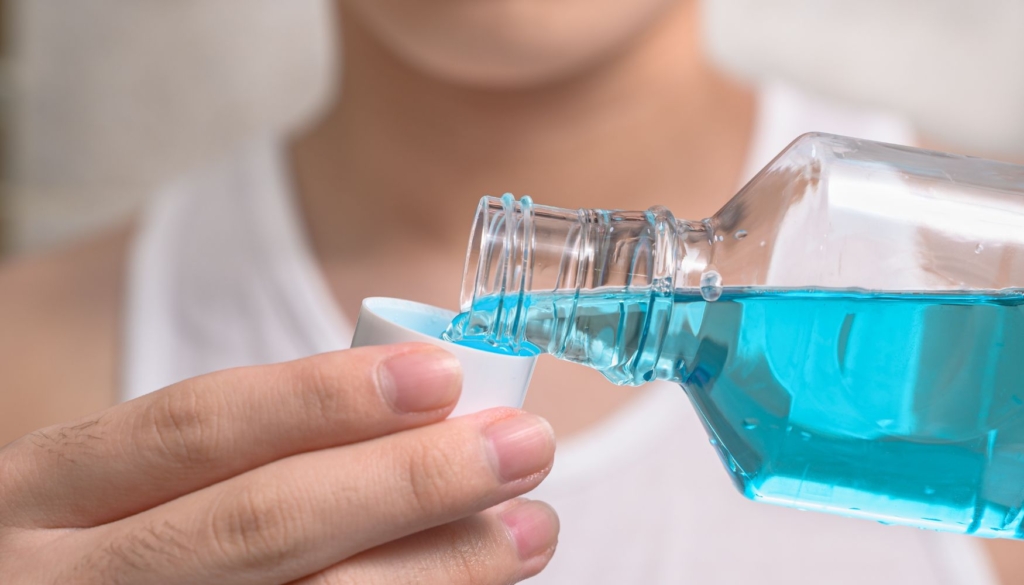Does Mouthwash Expire? How Long It Lasts & When To Toss It
You’ve found an unused or unfinished bottle of mouthwash in your mirror cabinet or under your sink, and you have that niggling feeling of uncertainty about whether you should use it or trash it.
Whether you want to save a few bucks or avoid the inconvenience of buying a brand new bottle, consider heeding that little voice that puts your well-being first. There are several reasons those few ounces of mouthwash are not worth saving.
In this article, Mint Dental Works discusses mouthwash expiration and the reasons you should honor the date printed on the bottle.
Table of Contents
- Does Mouthwash Have an Expiration Date?
- 5 Reasons You Should Replace Expired Mouthwash
- Mint Dental Works: SE Portland Dentist With a Fresh Approach to Dental Care
Does Mouthwash Have an Expiration Date?
Yes, mouthwash has an expiration date based on its shelf life. Over time, as the ingredients break down, the product loses its potency. Depending on the particular product you use, disintegration shouldn’t compromise its effectiveness until 2-3 years after it was manufactured. This is reflected in the expiration date printed somewhere on the bottle.
Mint Dental Works can recommend mouthwash products that we deem safest and most effective. Call us today to schedule an appointment and discuss how you can improve your oral health.
How Do You Know if Mouthwash Is Close to Expiring?
Besides proximity to the expiration date, you may notice physical changes in the mouthwash that indicate the product is becoming ineffective. These include:
- Any change in color: Fresh mouthwash is usually a bright blue or green color, but expired mouthwash may be faded or look cloudy. This indicates a deterioration of the ingredients.
- An unpleasant (or just different) smell: A fresh, minty aroma should greet you when you remove the cap, so if you detect a sour or musty smell, this could be a sign of bacterial growth or chemical degradation.
- A thicker or thinner consistency: Fresh mouthwash should be about the consistency of water. If it is thicker or slimier, it is almost certainly not something you want to put in your mouth.
- A stale, bitter, or less minty taste: At this point, you’ve gone pretty far in testing out your questionable mouthwash. If this is your experience, well, you have your answer.
If you are dealing with a mouthwash you’ve never used before, you might not realize a change has occurred, especially if it has remained hidden in a drawer for a long time. In addition, the change might not immediately seem unappealing, so you could be lulled into thinking the product is fine when it really should be discarded. Always honor the expiration date, regardless of the product’s appearance.
How Long Does Mouthwash Last After the Expiration Date?
Generally, mouthwash should be considered no longer effective after its expiration date, but it may still have a few more months of “life” left. Still, it’s best to replace it; otherwise, you won’t know if any shortcomings are due to expiration or the quality of the product as manufactured.
This information will help you decide whether to purchase a different brand of mouthwash. If you are already committed to this brand, then replacing it ensures you receive the benefits you know it can deliver if the product is still fresh.
The FDA regulates expiration dates on drugs and cosmetic products and, along with the American Dental Association, classifies mouthwash as cosmetic or therapeutic, based on its capabilities.
Cosmetic Mouthwash
Mouthwash that helps to mask bad breath and leaves a pleasant taste but has no real dental benefit is considered cosmetic. This type does not contain antibacterial ingredients.
Therapeutic Mouthwash
Therapeutic mouthwash contains active ingredients that help prevent dental problems. Alcohol in mouthwash helps disinfect the mouth and enhances flavor, but it also serves as a solvent for other active ingredients, including:
- Fluoride: Protects tooth enamel and thus helps prevent tooth decay.
- Peroxide: A soothing, rather than harsh, disinfectant that helps whiten teeth.
- Cetylpyridinium chloride: Combats bad breath by targeting odor-causing bacteria.
- Chlorhexidine: Helps prevent plaque buildup and gingivitis. Only available by prescription.
- Essential oils: Also help prevent plaque and gingivitis, but are available over the counter. Different oils have been found to perform many therapeutic functions, including anti-inflammatory, analgesic, antimicrobial, and antifungal.
5 Reasons You Should Replace Expired Mouthwash
#1: Reduced Effectiveness
Mouthwash contains organic compounds, which are susceptible to degradation by oxidation (when exposed to the air) and hydrolysis. As these ingredients degrade over time, they become less effective at killing germs and freshening breath.

#2: Minimize Possible Bacterial Contamination
Besides reducing the effectiveness of your mouthwash, degradation of preservative ingredients may signify an environment more conducive to bacterial growth. For example, as alcohol is degraded, the product contains more water that fosters bacterial growth within the product container. This can occur whether the product is opened or not.
If the product is opened, the risk of bacterial growth is increased. The introduction of oxygen and bacteria from the air (or your mouth, if you are in the habit of swishing directly from the container) upsets the balanced formula of ingredients designed to improve oral health.
#3: Prevent Irritation and Negative Side Effects
Expired ingredients can break down into compounds that are harmful to your oral health. For example, it can cause:
- Canker sores
- A burning sensation
- Xerostomia (dry mouth)
- General pain or sensitivity
- Bleeding gums
- Stained teeth
- Oral irritation targeting the gums, tongue, or the mucous membranes within the mouth
While these negative side effects are not guaranteed, they are a far cry from your hopes of a cleaner, healthier mouth. Instead of risking these unwanted symptoms, it’s probably best to buy a fresh bottle of mouthwash.
#4: Misleading Sense of Oral Hygiene
Because your mouthwash’s effectiveness isn’t assured past the expiration date, you can’t be confident that it is doing what it’s designed to do after that. You might get the illusion your mouth is clean after you so faithfully swish, but if you want to get the full return on your investment, you’ll need to forego the old stuff.
To confidently combat plaque, bacteria, bad breath, and other oral nuisances, use a newer product.
#5: Avoid an Unpleasant Experience
Your expired mouthwash might or might not be repulsive in appearance, but using it may turn out to be an unsavory experience you’d rather have spared yourself.
Although our senses are often useful in warning us to steer clear of something harmful — as when we are not inclined to eat something that smells unpleasant or that has an unappetizing texture — they are not always keen enough until it’s too late. For this reason, it’s best to take a look at the expiration date before tipping the liquid into your mouth.
How to Properly Store Mouthwash for Longer Shelf Life
If you want to get what you’ve paid for in terms of your mouthwash, it’s important to store it properly so that it will last as long as it’s meant to. If you don’t follow the rules for proper storage, your mouthwash could become less potent or even turn rancid sooner than the manufacturers predicted. Don’t just leave it lying around, where it will be subjected to temperature fluctuations or physical damage from being knocked around.
Follow these tips to ensure your mouthwash lasts until its expiration date:
Keep It Cool and Dry
High temperatures and humidity can degrade the active ingredients by facilitating chemical reactions in the solution, especially if it is alcohol-based. Alcohol, which is the solvent for many mouthwashes, oxidizes faster when heated.
To avoid the more rapid oxidation of alcohol, store the mouthwash somewhere dark and dry, where it can rest undisturbed at room temperature or cooler. The best place may be a bathroom cabinet or vanity.
Avoid Temperature Extremes
Higher temperatures can accelerate chemical reactions that change the chemical composition of the mouthwash, but too-low temperatures can also be damaging. Mouthwash containing essential oils or fluoride can form a precipitate if kept in extreme cold.
For this reason, do not store mouthwash near any source of heat (such as a space heater) or in your car, where it may succumb to extreme cold or heat, depending on the weather.
Ensure the Cap Is Tightly Sealed
An improperly sealed bottle of mouthwash will not remain effective until its expiration date for two main reasons:
- Exposure to oxygen in the air allows oxidation reactions to occur at a higher rate. As active ingredients oxidize, they no longer perform their critical function within the mouthwash.
- Exposure to bacteria and dust in the air contaminates the mouthwash. It could be very unpleasant or even dangerous to use.
Therefore, be sure there are no puncture holes anywhere in the bottle and the cap still has integrity and is closed tightly.
Store in Original Packaging
Keep your mouthwash in the bottle it came in. Some bottles are made opaque to protect the solution from the air and from UV rays, which can accelerate degradation of some ingredients.
You may be tempted to pour the mouthwash from its original bottle into one that better fits in the appropriate storage space. This is inadvisable for a couple of reasons:
- Every part of the solution exposed to air collects dust and bacteria.
- You will no longer find instructions adhered to the original bottle, which would tell you the expiration date, how much to use, and for how long.
Check for Signs of Leakage
Besides allowing your mouthwash to trickle or evaporate, any damage to the bottle could provide an entry point for bacteria. Look for cracks, punctures, or other defects, particularly if you are getting nearer the expiration date. These defects can result from errors in manufacturing or shipping, but they are also likely to come about after being jostled or moved from place to place while in your possession.
These simple actions can make the difference between fresh and putrid mouthwash. Obviate the need to buy a brand new bottle by keeping the one you already bought in good condition.

Mint Dental Works: A SE Portland Dentist With a Fresh Approach to Dental Care
If you are concerned about whether your mouthwash is still performing its best, you are already being proactive about your dental health. Go a step further and visit the best SE Portland dentist for your regular dental care.
Besides providing expert recommendations for oral care products, we provide the following services:
- General dentistry:
- Exams, cleanings, and X-rays
- Composite fillings
- Single-visit crowns
- Sealants
- Special dentistry:
- Periodontics
- Endodontics
- Dental implants
- Cosmetic dentistry
- Orthodontics
- Veneers
- Teeth whitening
Our approach to dental care is environmentally friendly, committed to reducing waste, employing energy- and water-efficient fixtures, and using only non-toxic materials. We are also dedicated to providing a relaxed, family-friendly setting so you can look forward to your visits.
Call Mint Dental Works today to schedule your first visit to optimize your oral health.
The content in this blog is not intended to be a substitute for professional medical advice, diagnosis, or treatment. Always seek the advice of your physician or other qualified health provider with any questions you may have regarding a medical condition.

